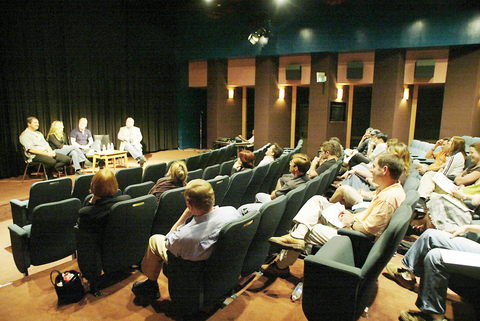Tucked away in the Hollywood hills, an elite group of scientists from across the country and from a grab bag of disciplines -- rocket science, nanotechnology, genetics, even veterinary medicine -- has gathered this week to plot a solution to what officials call one of the US' most vexing long-term national security problems.
Their work is being financed by the Air Force and the Army, but the Manhattan Project it ain't: The 15 scientists are being taught how to write and sell screenplays.
At a cost of roughly US$25,000 in Pentagon research grants, the American Film Institute is cramming this eclectic group of midcareer researchers, engineers, chemists and physicists full of pointers on how to find their way in a world that can be a lot lonelier than the loneliest laboratory: the wilderness of story arcs, plot points, pitching and the special circle of hell better known as development.

PHOTO: NY TIMES
And no primer on Hollywood would be complete without at least three hours on "Agents and Managers."
Exactly how the national defense could be bolstered by setting a few more people loose in Los Angeles with screenplays to peddle may be a bit of a brainteaser. But officials at the Air Force Office of Scientific Research spell out a straightforward syllogism:
Fewer and fewer students are pursuing science and engineering. While immigrants are taking up the slack in many areas, defense laboratories and industries generally require American citizenship or permanent residency. So a crisis is looming, unless careers in science and engineering suddenly become hugely popular, said Robert Barker, an Air Force program manager who approved the grant. And what better way to get a lot of young people interested in science than by producing movies and television shows that depict scientists in flattering ways?
Teaching screenwriting to scientists was the brainstorm of Martin Gundersen, a professor of electrical engineering at the University of Southern California and sometime Hollywood technical adviser, whose biggest brush with stardom was bringing a little verisimilitude to Val Kilmer's lasers in the 1985 comedy Real Genius.
More recently, he was asked to review screenplays by the Sloan Foundation, which awards prizes for scientific accuracy, and found most to be "pretty dismal," as he put it.
"My thought was, since scientists have to write so much, for technical journals and papers, why not consider them as a creative source?" Gundersen said.
He already had contacts at the American Film Institute, and he quickly persuaded Barker, who oversees several of his other grants, to endorse what began as a weekend seminar last summer and was expanded to five days this year. The Air Force is providing US$100,000 annually for three years; the Army Research Office has added US$50,000 this year.
Much of that money will pay for other like-minded efforts: Gundersen is also starting a workshop for high school students at the film institute, and he plans to get entertainment industry people to lead seminars at scientific conferences and to give seminars to up-and-coming screenwriters on how to reach out to scientists for help with accuracy.
For now, though, the hopes of the Pentagon for a science-friendly cinema seem to be riding on the shoulders of people like Bogdan Marcu, an engineer for Boeing's rocket propulsion division who is nursing an idea for a spy thriller, and Sam Mandegaran, a PhD candidate in electrical engineering at the California Institute of Technology who says he wants to become a director of science-friendly movies for young people because "adults are a lost cause."
Around a table at the institute's campus, they and their colleagues, chosen from some 50 applicants, listened this week as Syd Field, author of some of the most popular how-to books on screenwriting, steeped them in the ABCs of three-act structure.
They wrestled with how to reconcile the cinematic suspension of disbelief with the scientific method and with their basic purpose of bringing accuracy to the screen.
And they got feedback for their own script ideas. A disaster movie set at the Olympics, where athletes get a virus that makes them smarter? (Problem: The main character was the virus.) A biopic on the inventor of the Ferris wheel, who died a sad and lonely alcoholic? ("Do I have to like the character?" asked its author, Jeffrey Hoch. Hardly -- think Raging Bull, he was told by Alex Singer, a veteran television director.)
Hoch was full of searching questions. "When I'm writing for a scientist, I write for my peers," he said. "Who are we writing for? The viewer? The director? The money people?"
"Tell your story for you," Field urged him. "Then, go back and rewrite it."
Gundersen chimed in, "It's different from writing for a science journal. That has to be right; you'd better not make a mistake, because people will beat the hell out of you. In a movie, I wouldn't want to say it doesn't have to be right, but it's different."
Singer added, "They will not forgive you for being bored. They'll forgive you for anything else."

Seven hundred job applications. One interview. Marco Mascaro arrived in Taiwan last year with a PhD in engineering physics and years of experience at a European research center. He thought his Gold Card would guarantee him a foothold in Taiwan’s job market. “It’s marketed as if Taiwan really needs you,” the 33-year-old Italian says. “The reality is that companies here don’t really need us.” The Employment Gold Card was designed to fix Taiwan’s labor shortage by offering foreign professionals a combined resident visa and open work permit valid for three years. But for many, like Mascaro, the welcome mat ends at the door. A

The Western media once again enthusiastically forwarded Beijing’s talking points on Japanese Prime Minister Sanae Takaichi’s comment two weeks ago that an attack by the People’s Republic of China (PRC) on Taiwan was an existential threat to Japan and would trigger Japanese military intervention in defense of Taiwan. The predictable reach for clickbait meant that a string of teachable moments was lost, “like tears in the rain.” Again. The Economist led the way, assigning the blame to the victim. “Takaichi Sanae was bound to rile China sooner rather than later,” the magazine asserted. It then explained: “Japan’s new prime minister is

NOV. 24 to NOV. 30 It wasn’t famine, disaster or war that drove the people of Soansai to flee their homeland, but a blanket-stealing demon. At least that’s how Poan Yu-pie (潘有秘), a resident of the Indigenous settlement of Kipatauw in what is today Taipei’s Beitou District (北投), told it to Japanese anthropologist Kanori Ino in 1897. Unable to sleep out of fear, the villagers built a raft large enough to fit everyone and set sail. They drifted for days before arriving at what is now Shenao Port (深奧) on Taiwan’s north coast,

Divadlo feels like your warm neighborhood slice of home — even if you’ve only ever spent a few days in Prague, like myself. A projector is screening retro animations by Czech director Karel Zeman, the shelves are lined with books and vinyl, and the owner will sit with you to share stories over a glass of pear brandy. The food is also fantastic, not just a new cultural experience but filled with nostalgia, recipes from home and laden with soul-warming carbs, perfect as the weather turns chilly. A Prague native, Kaio Picha has been in Taipei for 13 years and